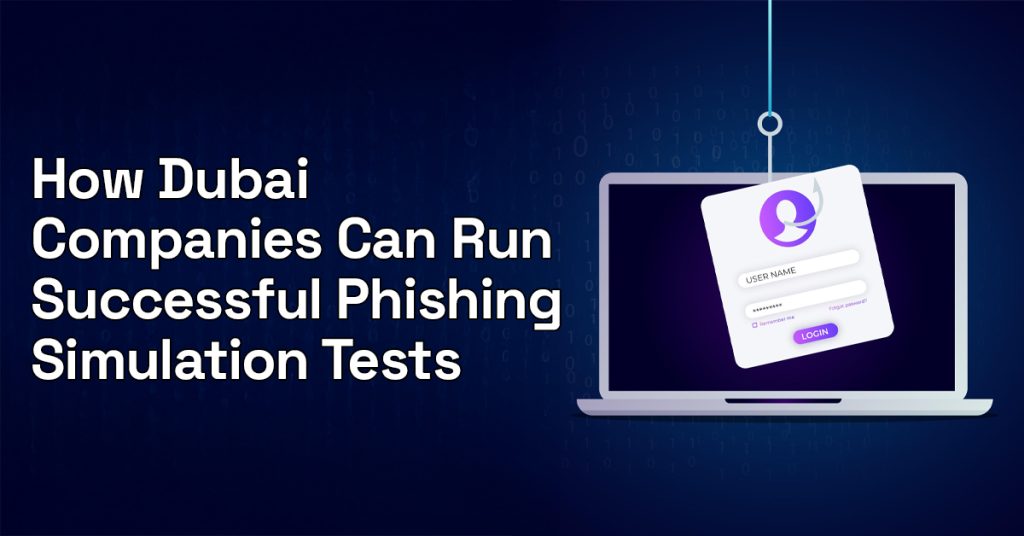How Dubai Companies Can Run Successful Phishing Simulation Tests

Phishing Simulation Tests: With Dubai positioning itself as a global technology hub, organizations face increasingly sophisticated cyber threats that target vulnerabilities. Phishing attacks have become the most common entry point for cybercriminals, making phishing simulation campaigns an essential component of any robust cybersecurity strategy.
This comprehensive guide explores the best practices for implementing effective phishing simulation campaigns specifically tailored for Dubai’s dynamic business environment.
Understanding the Cybersecurity Landscape in Dubai
Dubai’s rapid digital transformation has created unique cybersecurity challenges that require specialized approaches to phishing simulation campaigns. The emirate’s diverse workforce, multilingual environment, and mix of traditional and modern business practices demand carefully crafted simulation strategies. Organizations seeking the best phishing simulator Dubai has to offer must consider these local factors when selecting their cybersecurity solutions.
Key Factors Influencing Dubai’s Cyber Threat Environment
The UAE’s National Cybersecurity Strategy 2031 emphasizes the critical importance of human-centered security awareness. Dubai businesses must navigate cultural sensitivities while maintaining effective security protocols. This balance requires simulation campaigns that respect local customs while delivering impactful learning experiences.
Recent statistics show that 90% of successful cyberattacks begin with phishing emails, making phishing simulation services UAE organizations implement not just beneficial but absolutely crucial for Dubai enterprises.
Essential Pre-Campaign Planning Strategies
Define Clear Objectives and Success Metrics
Before launching any phishing simulation campaign, organizations must establish specific, measurable goals. These objectives should align with both local compliance requirements and international cybersecurity standards.
For example, setting a goal to reduce phishing click rates from 25% to under 10% within six months.
Secure Leadership Buy-in and Resource Allocation
Successful phishing simulation campaigns require strong support from C-suite executives and adequate resource allocation. Dubai’s hierarchical business culture makes leadership endorsement particularly crucial for campaign success.
Organizations should present clear ROI calculations demonstrating how simulation campaigns protect against potential financial losses, regulatory penalties, and reputational damage.
Creating Culturally Relevant Phishing Scenarios
Leverage Local Context and Current Events
Effective phishing simulations in Dubai must incorporate locally relevant themes that resonate with employees while remaining realistic and educational rather than deceptive or harmful.
Address Multilingual Workforce Considerations
Dubai’s international business environment requires phishing simulations in multiple languages, including Arabic, English, Hindi, and Urdu. However, campaigns must go beyond simple translation to consider cultural communication patterns and business etiquette expectations.
Implementation of Best Practices for Maximum Impact
Start with Baseline Measurements and Gradual Complexity
Begin phishing simulation campaigns with simple scenarios to establish baseline vulnerability levels across different departments and employee groups. We use a data-driven approach which enables targeted improvements and demonstrates measurable progress over time with companies that work with us at simUphish.
Progressive difficulty scaling example:
- Month 1: Basic promotional emails with obvious warning signs
- Month 3: Moderate sophistication with mixed legitimate and suspicious elements
- Month 6: Advanced scenarios mimicking actual threat patterns observed in the region
Cybersecurity is no longer everyone’s problem.
Timing and Frequency Optimization
Strategic timing maximizes both participation rates and learning effectiveness. Organizations should consider local business cycles, cultural events, and seasonal patterns when scheduling simulation campaigns specific to where they are based.
Optimal frequency typically ranges from monthly basic simulations to quarterly comprehensive campaigns, depending on organizational risk levels and employee responsiveness. High-risk sectors like banking and healthcare may require more frequent testing, while other industries might benefit from deeper, less frequent engagements.
Advanced Analytics and Continuous Improvement
Leverage Data-Driven Insights for Targeted Training
Modern phishing simulation software Dubai businesses rely on detailed analytics that enable organizations to identify specific vulnerability patterns and customize training accordingly. Companies should focus on metrics beyond simple click rates to gain a comprehensive understanding of security awareness levels when running their phishing campaign in Dubai initiatives.
Key performance indicators include time-to-click, reporting rates for suspicious emails, repeat offender identification, and department-specific vulnerability trends. This granular data enables precise training interventions and resource allocation optimization.
Integration with Broader Security Awareness Programs
Phishing simulations achieve maximum effectiveness when integrated with comprehensive cybersecurity training programs. We use a holistic approach at simUphish that ensures that employees understand not just what to avoid, but why these threats exist and how they fit into the broader security landscape.
Following each simulation with a brief educational video explaining the specific tactics used boosts retention rates with the employees.
Compliance and Regulatory Considerations
Align with UAE Cybersecurity Requirements
Dubai organizations must ensure their phishing simulation campaigns comply with UAE Data Protection Law, Dubai Data Law, and sector-specific regulations. This includes proper consent mechanisms, data handling procedures, and privacy protection measures.
The Dubai Electronic Security Center (DESC) provides guidelines for cybersecurity best practices that should inform simulation campaign design. Organizations should document their security awareness efforts to demonstrate compliance during regulatory audits.
Balance Security Testing with Employee Rights
Effective phishing simulations require a careful balance between security testing and employee privacy rights. Dubai’s multicultural workforce brings diverse expectations about workplace monitoring and testing procedures.
Best practices include transparent communication about simulation purposes, clear opt-out procedures for personal devices, and respectful handling of employee performance data. Organizations should focus on education and improvement rather than punishment or embarrassment.
Measuring Long-Term Success and ROI
Establish Comprehensive Success Metrics
Beyond immediate click rates and reporting statistics, successful phishing simulation campaigns in Dubai should track long-term behavioral changes and organizational security posture improvements.
At simUphish, we track meaningful metrics like reduced actual phishing incidents, improved security incident reporting rates, faster threat detection times, and decreased time-to-remediation for security events. Organizations should also monitor employee confidence levels and security awareness survey results.
Calculate and Communicate Return on Investment
Dubai organizations should regularly calculate and communicate the ROI of their phishing simulation investments to maintain leadership support and justify program expansion. This calculation should include both direct cost savings from prevented attacks and indirect benefits like improved regulatory compliance and enhanced reputation protection.
ROI calculation example: A Dubai real estate firm invested $50,000 annually in comprehensive phishing simulation campaigns and avoided an estimated $2.3 million in potential losses from prevented ransomware attacks, achieving a 4,500% return on investment while strengthening their overall security culture.
Technology Integration and Platform Selection
Choose Platforms with Regional Support and Customization
Dubai organizations should select the best phishing simulator Dubai market offers, ensuring platforms provide regional support, Arabic language capabilities, and customization options for local business contexts.
The chosen phishing simulation software companies implement should integrate seamlessly with existing security infrastructure and provide comprehensive analytics capabilities.
Consider phishing simulator UAE platforms that offer real-time monitoring, automated report generation, and integration with popular email systems used in Dubai business environments.
Future Trends and Emerging Considerations
As cyberthreats continue evolving, Dubai organizations must ensure their phishing simulation campaigns remain current and effective. This includes incorporating new attack vectors like AI-generated content, voice phishing (vishing), and SMS-based attacks.
Emerging technologies like artificial intelligence and machine learning are both creating new threats and enabling more sophisticated simulation capabilities. Forward-thinking organizations should explore these technologies while maintaining focus on fundamental security awareness principles.
Conclusion
Implementing effective phishing simulation campaigns in Dubai requires careful planning, cultural sensitivity, and commitment to continuous improvement. Organizations that follow these best practices while adapting to their specific industry requirements and workforce characteristics will significantly strengthen their cybersecurity posture. The key to success lies in viewing phishing simulations not as one-time tests, but as ongoing investments in human-centered security awareness that protect both individual employees and organizational assets. By combining realistic scenarios, comprehensive analytics, and targeted training interventions, Dubai enterprises can build resilient security cultures that effectively counter evolving cyber threats.
Remember that successful cybersecurity awareness is an ongoing journey rather than a destination, requiring consistent attention, regular updates, and genuine commitment to employee education and empowerment in the face of ever-changing digital risks.
FAQ's
- 1. A phishing simulation test: what is it?Fake phishing emails are sent to employees as part of a controlled exercise to gauge their reaction and instil safer behaviour.
- 2. Why should businesses simulate phishing attacks?They help focus training where it's most needed, enhance reporting, and lower the number of successful attacks.
- 3. How can I establish objectives for a simulation program?Determine deadlines, set quantifiable goals (e.g., reduce the click rate by X%), and monitor reporting and repair progress.
- 4. Who has the authority to authorise a phishing simulation?To guarantee compliance with policy, privacy, and organisational culture, senior leadership, legal, and HR are involved.
- 5. How frequently ought one to conduct simulations?Monthly fast checks and quarterly comprehensive campaigns are standard procedure; for high-risk teams, the frequency should be increased.
- 6. Do localised simulations make sense?Yes, for realism and improved learning, adapt language, cultural background, and scenarios to your workforce.
- 7. How does one go about starting a program?Select a platform, divide people into roles and risks, create follow-up training, and benchmark with a basic test.
- 8. Which metrics are most important?Trends in department-level vulnerabilities, click rate, report-to-security rate, time-to-click, and repeat offenders.
- 9. How can we safeguard the privacy of our employees?Be open and honest about your intentions, restrict the use of data to training, refrain from naming or humiliating people in public, and include legal and HR oversight.
- 10. What should post-fail training cover?Instant microlearning (short videos or tips), a description of the strategy employed, and instructions on how to report or prevent it in the future.
- 11. How are compliance and simulations related?They exhibit due diligence, assist in adhering to data and security regulations, and offer audit-ready proof of awareness campaigns.
- 12. Which platform features are necessary?Campaign automation, analytics/dashboarding, email infrastructure integration, scenario customisation, and multilingual support.
- 13. How are repeat offenders handled?If, after training, behaviour doesn't improve, use follow-up tests, focused coaching, and managers.
- 14. Can additional channels be included in simulations?Yes, for realistic, cross-channel coverage, add voice (vishing), SMS (smishing), email, and social engineering situations.
- 15. How can I assess the return on investment of phishing simulations?Examine the anticipated costs of avoided occurrences, shortened cleanup times, compliance advantages, and enhanced incident management.





https://shorturl.fm/a5nSn
https://shorturl.fm/xXar2
https://shorturl.fm/l0B3J
https://shorturl.fm/omWfQ
Banca30 Website has a great variety of games! I especially enjoy the fishing games, they’re super engaging. The site is easy to navigate, and the support is helpful. Giving it a thumbs up! You can find it here: banca30website
https://shorturl.fm/YYlwM
For all you football fanatics, bet69 kèo bóng đá is the place to be! They’ve got all the latest odds and info on every game you could want! Game on! bet69 kèo bóng đá
https://shorturl.fm/92ZES
https://shorturl.fm/60KXX
https://shorturl.fm/B8Ioh
https://shorturl.fm/oKOpD
Tried out tigamego88club. The interface is a classic look and feel that isn’t too over the top. No issues to report so good to go. I personally recommend to check out tigamego88club, and happy gaming!
Yo, been playing on Appvay88 lately. Gotta say, it’s got a decent selection of games and pretty smooth gameplay. Give appvay88 a look if you’re trying to find a new spot to chill!
DK11game has some alright games. Nothing super groundbreaking, but good for killing some time. Give dk11game a look if you’re bored.
Baccarat’s beauty lies in pattern recognition, but even skilled players need reliable platforms. Seeing Bee PH prioritize quick registration & localized payments (like GCash!) is smart. Check out this bee ph link for a streamlined experience – RTP matters! 😉
Start sharing, start earning—become our affiliate today!
Become our partner now and start turning referrals into revenue!
Share our products, reap the rewards—apply to our affiliate program!
Earn up to 40% commission per sale—join our affiliate program now!
Start sharing, start earning—become our affiliate today!